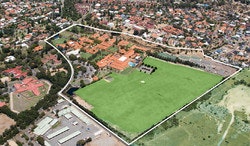Year 12 English ATAR
This course is designed for students who wish to study English ATAR in Year 12 and sit a WACE English examination at the end of Year 12 to gain university entrance. English ATAR is a difficult course and requires application of theory to textual analysis.
The English ATAR course focuses on developing students' analytical, creative and critical thinking and communication skills in all language modes. It encourages students to critically engage with texts from their contemporary world, with texts from the past and with texts from Australian and other cultures. Such engagement helps students develop a sense of themselves, their world and their place in it.
Through close study and wide reading, viewing and listening, students develop the ability to analyse and evaluate the purpose, stylistic qualities and conventions of texts and enjoy creating their own imaginative, interpretive, persuasive and analytical responses. The English ATAR course is designed to develop students' facility with all types of texts and language modes and to foster an appreciation of the value of English for lifelong learning.
Students refine their skills across all language modes by engaging critically and creatively with texts. They learn to speak and write fluently in a range of contexts and to create a range of text forms. They hone their oral communication skills through discussion, debate and argument, in a range of formal and informal situations.
Unit 3
Students explore representations of themes, issues, ideas and concepts through a comparison of texts. They analyse and compare the relationships between language, genre and contexts, comparing texts within and/or across different genres and modes. Students recognise and analyse the conventions of genre in texts and consider how those conventions may assist interpretation. Students compare and evaluate the effect of different media, forms and modes on the structure of texts and how audiences respond to them. Understanding of these concepts is demonstrated through the creation of imaginative, interpretive, persuasive and analytical responses.
Unit 4
Students examine different interpretations and perspectives to develop further their knowledge and analysis of purpose and style. They challenge perspectives, values and attitudes in texts, developing and testing their own interpretations through debate and argument. Through close study of texts, students explore relationships between content and structure, voice and perspectives and the text and context. This provides the opportunity for students to extend their experience of language and of texts and explore their ideas through their own reading and viewing. Students demonstrate understanding of the texts studied through creation of imaginative, interpretive, persuasive and analytical responses.
Assessment
The following types of assessments and weightings will be undertaken:
Responding: 35% | Creating: 35% | Examination: 30%
Examinations will take place at the end of Semesters One and Two and will cover key content of the unit or units covered in that semester.
Reporting
The achievement for the unit will be reported as a College A - E grade. In addition, the student's approach to class work and behaviour will be reported via the usual key performance indicators.
Student Expectations/ĚÇĐÄVlogwork
Students will be expected to complete approximately 2.5 hours of homework each week. This time should be spent consolidating material covered in class as well as any assigned tasks.
